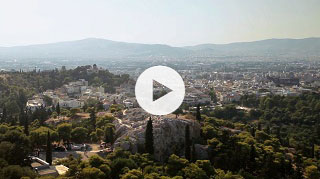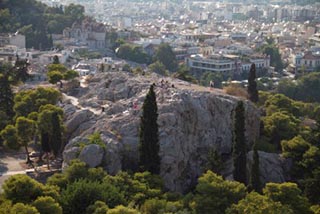17:1–9 Paul travels to Thessalonica, the capital of the province of Macedonia. His stay there is cut short by persecution, and his letters to the church there (1–2 Thessalonians) display his care for them and desire that they remain faithful in the midst of opposition. |
17:1 Thessalonica A major city in the Roman province of Macedonia, Thessalonica was about 95 miles west of Philippi along the Egnatian Way. It served as a port with close ties with Rome.
Thessalonica was about 95 miles west of Philippi along the Egnatian Way. It served as a port with close ties with Rome.
a synagogue Compare 16:13 and note.
17:2 from the scriptures There are earlier examples of Paul preaching this type of message (e.g., 13:13–41).
17:3 it was necessary for the Christ to suffer and to rise from the dead Paul’s preaching centers on the death and resurrection of Jesus. He could have supported this viewpoint with Isa 53:10–12 (see note on Isa 53:10).
17:4 God-fearing Greeks Gentiles who worshiped the true God (see Acts 10:2 and note).
17:5 filled with jealousy As happened earlier in Pisidian Antioch (13:45), Iconium (14:2), and Lystra (14:19), the jealousy of particular local Jews compels them to oppose Paul and the movement of the early church.
17:7 contrary to the decrees of Caesar To press their case, the opposition accuses the Church of promoting sedition. Social, political, and religious beliefs were woven together so tightly that weakening or changing one was felt as destructive to the whole fabric.
another king, Jesus The Church’s promotion of Jesus as the true king makes its opponents see it as a threat to Caesar (compare Luke 23:2–3).
17:10–15 Having been driven out of Thessalonica, Paul moves on to Berea. In contrast to those in Thessalonica, the Jews in Berea are much more honorable and open-minded. |
17:10 Berea Located approximately 45 miles west of Thessalonica, about a three-day journey by foot. It was another major city in the Roman province of Macedonia.
17:11 open-minded Originally, the Greek term used here denoted noble birth. It later came to refer to anyone who had royal bearing—people who were more refined.
examining In nonjudicial contexts, the Greek term used here, anakrinō, often deals with questioning and discernment (compare 1 Cor 2:15; 10:25).
17:12 women and men Compare Acts 17:4.
17:14 sent Paul away It appears the main opposition was against Paul. Since Silas and Timothy do not leave, the ministry continues despite the opponents’ best efforts.
17:15 Athens Paul heads south to Athens, the center of Greek culture.
the center of Greek culture.
17:16–34 Paul’s ministry in Athens shows how he altered his approach in carrying out his mission to the Gentiles. His earlier speech at Pisidian Antioch depicts his message to Jews and God-fearing Gentiles (13:16–41), but his speech in Athens (vv. 22–34) shows how he approached Gentiles who had no knowledge of or commitment to the God of Israel. |
17:17 in the marketplace In addition to preaching in the synagogue, Paul also preached in the economic center of Athens, the agora. There, he could attract the attention of non-Jews.
17:18 Epicurean Epicureanism was a system of thought that asserted there was no connection between people and the divine. This belief was expressed in a desire to seek contentment and satisfaction and to avoid pain and discomfort.
was a system of thought that asserted there was no connection between people and the divine. This belief was expressed in a desire to seek contentment and satisfaction and to avoid pain and discomfort.
Epicureanism began with Epicurus (341–270 bc), who argued that the world was made of atoms and that the world was purely material. Epicureans attempted to free people from the idea of the gods, the afterlife, and the fear of death. The only value that remained was the physical reality of the individual, and thus the individual was freed from fear to pursue what truly gave pleasure; Epicurus stressed that contentment and nobility produced the best, most enjoyable life. |
Stoic Stoicism was an essentially pantheistic system of thought that prioritized logic over all other faculties.
was an essentially pantheistic system of thought that prioritized logic over all other faculties.
Stoicism was founded by Zeno in the third century bc. Contrary to Epicureanism, Stoicism contended that the physical universe is empowered by a reasoning force known as logos, which connects the divine with the material. Ethically, stoics attempted to live in accordance with the natural laws they observed and systematized. |
the resurrection Resurrection was contradictory both to the Epicurean idea that death ended all existence and the Stoic idea of uniting with the divine and disengaging from the material.
17:19 Areopagus Meaning the “hill of Aries.” Aries was the god of war in Greek mythology, who is called Mars in Latin. This was the name of a location and also of the civil and religious council that met there.
17:21 This description of the regular activity at the Areopagus (Mars Hill) helps establish the irony of Paul’s discourse. While the Athenians put Paul and Christianity on trial, Paul puts their philosophies on trial. Thus, what looks to the Athenians like confused thinking actually points to the incoherence in their philosophies. |
17:23 To an unknown God This unknown god demonstrates the lack of clarity and certainty in Athenian philosophy. They freely admit there could be a deity they are unaware of.
 Pagan Deities in the New Testament Table
Pagan Deities in the New Testament Table
proclaim Paul claims he will clarify the mysteries of the Athenians’ own philosophies.
17:24 made by human hands Since God transcends creation, He does not need a place to live—including the shrines on the nearby Acropolis.
17:26 from one man Paul mentions Adam as the individual from whom all people are descended.
17:27 search for God People have a desire to seek God, but their sin confuses their understanding.
they might feel The Greek verb used here denotes attempting to touch or handle something. In Greek literature, it refers to a blind person walking in the dark.
he is not far away This clashes both with the Epicurean belief of the divine as separate from the world, and Stoic notions of God’s presence in creation itself—that parts of creation were divine or divinely embodied.
17:28 for in him we live and move and exist Paul may be quoting the poet Epimenedes of Crete (compare Titus 1:12). Alternatively, he may simply be using a common statement in Greek thought.
we also are his offspring This is a quotation from one of the ancient poet-philosophers, probably the Stoic poet Aratus.
17:29 offspring of God Paul builds on the previous statement. The fact that people are God’s offspring shows that the living God is grander than idols.
17:31 to judge Paul has established God as Creator. As such, God has the right to judge the world.
17:32 the resurrection See note on Acts 17:18.
17:34 Dionysius the Areopagite While it is unclear whether Paul was appearing before an official meeting of the Areopagus (see note on v. 19), at least one member of the council was present and came to faith.

|
About Faithlife Study BibleFaithlife Study Bible (FSB) is your guide to the ancient world of the Old and New Testaments, with study notes and articles that draw from a wide range of academic research. FSB helps you learn how to think about interpretation methods and issues so that you can gain a deeper understanding of the text. |
| Copyright |
Copyright 2012 Logos Bible Software. |
| Support Info | fsb |
 Loading…
Loading…
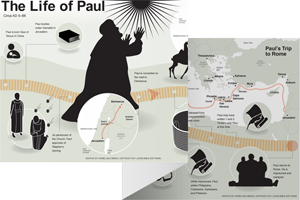

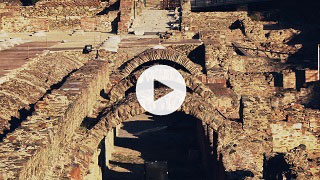
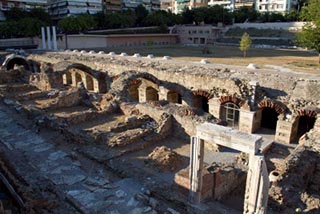
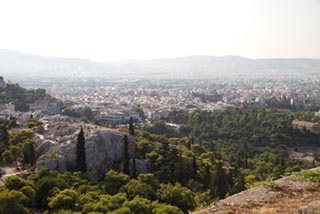
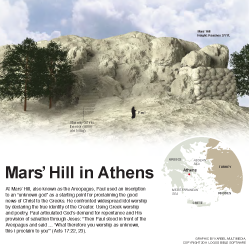
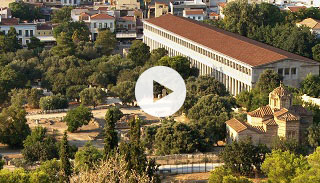
 Epicureans
Epicureans 
